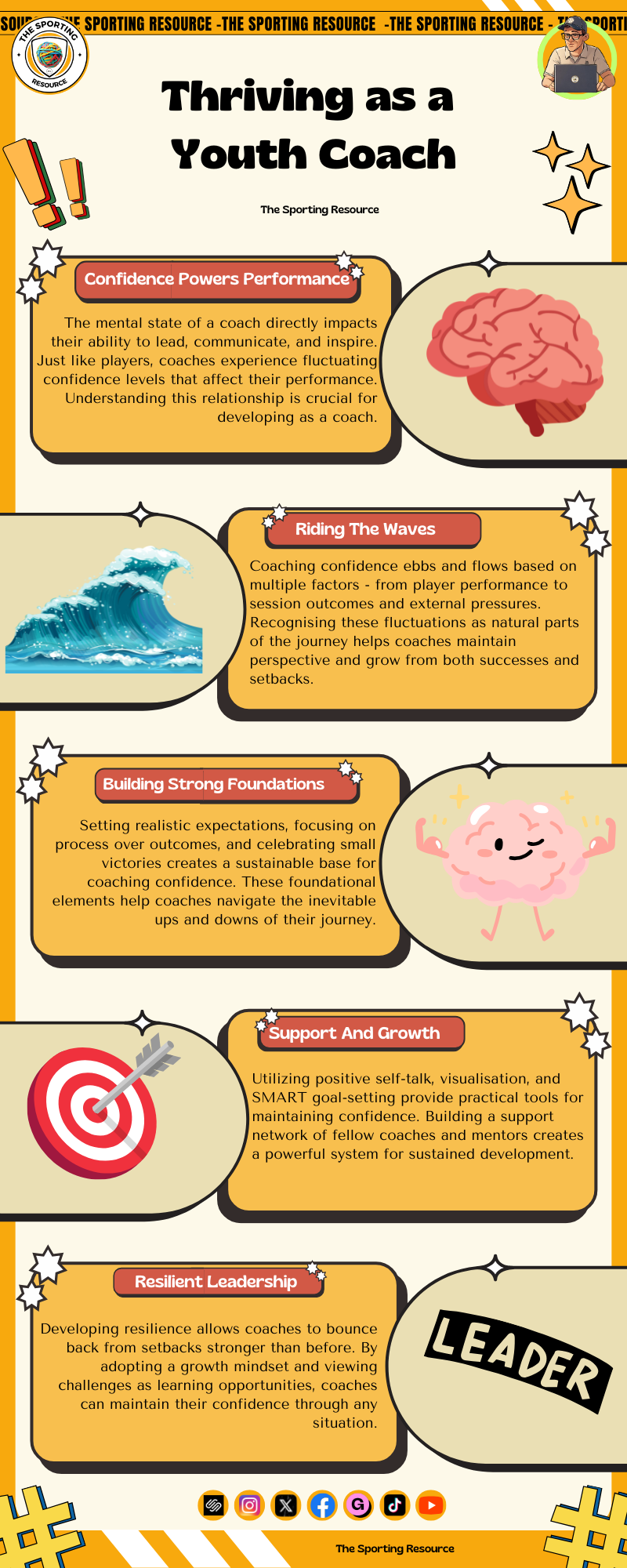We all share an incredible passion for the game and the responsibility of nurturing young talents on their journeys. But let’s be honest, there’s an aspect of coaching that we don’t always openly discuss: the rollercoaster of confidence. Confidence is the fuel that propels coaches towards their potential. It ignites self-belief, encourages risk-taking, and drives peak performance. But here’s the thing: confidence isn’t just crucial for our players, it’s equally vital for us as coaches. Our level of confidence directly affects how we communicate, lead, and inspire.
In this blog, we’ll delve into the exhilarating world of coaching confidence, exploring the highs and lows, the challenges and triumphs. We’ll unravel the complexities of this emotional rollercoaster and equip you with practical strategies to maintain confidence amidst the turbulence. Because when we ride the waves of confidence, we thrive as youth football coaches, unlocking our true potential and that of our players.
Understanding the Confidence Rollercoaster
The enigmatic rollercoaster of confidence—a journey that every coach embarks on at some point. To navigate this thrilling ride, it’s essential to understand the nature of confidence fluctuations and why they occur. Confidence is a delicate creature. It ebbs and flows like the tides, influenced by a myriad of factors unique to each of us. Player performance, session outcomes, our understanding, planning and preparation, and external pressures all play a significant role in shaping our confidence levels.
When our players are in top form—scoring goals, executing technical aspects of sessions, and showcasing their talents—we often bask in the glow of confidence.
We feel like master puppeteers, orchestrating their success. But, when our players struggle or fail to meet expectations, our confidence takes a hit. Doubts creep in, questioning our abilities as coaches and leaving us wondering if we’ve done enough.
Session outcomes also have a powerful impact on our confidence. A session that flows seamlessly, with players engaged and executing drills flawlessly, can leave us on cloud nine. We revel in the knowledge that we’ve crafted something special. Yet, on those days when sessions fall short—when drills seem lacklustre or fail to resonate with our players—our confidence can plummet. We question our choices, our methods, and our ability to lead effectively.
Let’s not forget the external pressures that can weigh heavily on our shoulders. Parents, club officials, and even our own self-imposed expectations can create a storm of pressure. The desire to meet these expectations and maintain a positive reputation adds an extra layer of complexity to the confidence rollercoaster. We need to recognise that confidence fluctuations are a natural part of the coaching journey. It’s okay to have ups and downs—it means you’re invested, passionate, and pushing yourself to be better. By acknowledging the factors that influence our confidence, we can gain perspective and take proactive steps to maintain a steady ride. It’s not about being invincible or unaffected by setbacks; it’s about finding the resilience to bounce back and grow stronger from them.
Embracing the Ups and Downs
Rather than fearing the ups and downs, let’s shift our perspective and view these fluctuations as a natural part of our growth, and they don’t make us weak or inadequate as coaches.
Just like the game itself, our confidence evolves, and it’s in the embrace of this evolution that we find our strength. The beauty of experiencing both highs and lows in confidence lies in the lessons they offer.
We inspire our players, make bold decisions, and create an environment that breeds success. These moments not only boost our own morale but also ignite a fire within our players, propelling them to reach new heights.
It’s during the lows, when doubts and insecurities creep in, that we truly grow as coaches.
These challenging moments force us to reflect, question, and adapt. They push us to dig deep, refine our strategies, and find new approaches that unlock our true potential. It’s through overcoming these lows that we develop resilience, innovation, and an unwavering belief in ourselves.
Strategies for Maintaining Confidence
Whether we’re facing setbacks, doubting our abilities, or dealing with external pressures, these tips will help us navigate the twists and turns of our coaching journey with resilience and belief.
1. Set Realistic Expectations: It’s important to set realistic expectations for ourselves and our players. Recognise that perfection is an elusive goal and that setbacks are part of the learning process. By setting achievable targets, we alleviate unnecessary pressure and create a positive environment for growth.
2. Focus on the Process: Instead of fixating solely on outcomes, shift your attention to the process. Concentrate on designing engaging sessions, fostering player development, and creating a positive team culture. When we focus on the process, we derive satisfaction from our efforts and find joy in the journey itself, regardless of the immediate results.
3. Celebrate Small Victories: Don’t overlook the power of celebrating small victories. Acknowledge the progress your players make, no matter how incremental. By highlighting their achievements, you foster a sense of confidence and motivate them to strive for further success. Remember, each step forward is a building block towards greatness.
4. Harness the Power of Positive Self-Talk: Engage in positive self-talk to bolster your confidence. Replace self-doubt and negative thoughts with empowering statements. Remind yourself of your coaching strengths, past successes, and the impact you’ve had on your players. By nurturing a positive inner dialogue, you’ll cultivate unwavering self-belief.
5. Visualise Success: Utilise the power of visualisation to enhance your confidence. Before important sessions or matches, take a few moments to vividly imagine yourself leading with confidence and your players excelling on the field. This mental rehearsal primes your mind for success, enabling you to step onto the pitch with a renewed sense of belief.
6. Set SMART Goals: Goal-setting is a valuable tool for boosting confidence. Set Specific, Measurable, Attainable, Relevant, and Time-bound (SMART) goals for yourself and your team. Breaking larger objectives into smaller, achievable milestones provides a sense of direction, progress, and accomplishment along the way.
7. Seek Support: Remember, you’re not alone on this coaching journey. Reach out to fellow coaches, mentors, or support networks to share experiences, seek guidance, and gain perspective. The power of a supportive community cannot be underestimated, as it provides reassurance, inspiration, and a platform for growth.
By integrating these strategies, you’ll not only enhance your confidence but also motivate your players and maintain a steady course through any ups and downs. Utilise these practical tools to build a resilient mindset and unlock the full potential of both yourself and your team.
Building Resilience
Developing resilience is crucial for us to bounce back from setbacks, maintain a strong mindset, and continue to lead with confidence. Resilience is the backbone of our success. It’s the ability to bounce back from defeats, setbacks, and obstacles, emerging stronger and more determined than ever. It’s not about avoiding failure but rather using it as a catalyst for growth and improvement. Resilience allows us to persevere, adapt, and thrive in the face of adversity.
In order to maintain a resilient mindset, it’s important to reframe setbacks as chances to learn and grow. When our team faces a loss or our strategies don’t go as planned, it’s common to feel self-doubt creeping in.
However, by adopting a resilient mindset, we see these challenges as lessons to be learned, rather than personal failures. We analyse what went wrong, identify areas for improvement, and use these experiences to refine our coaching approach.
One powerful strategy for maintaining resilience is to cultivate a growth mindset. Embrace the belief that our abilities and skills can be developed through dedication and effort. This mindset enables us to view challenges as stepping stones to success, to persist in the face of setbacks, and to continuously seek opportunities for improvement.
Resilience is not an overnight achievement but instead a continuous process. By embracing setbacks as opportunities for growth, cultivating a growth mindset, and incorporating resilience-building exercises into our routines, we can fortify our coaching foundation and become unwavering coaches for our teams. Use resilience as a catalyst for greatness and propel us forward, inspire our players, and rise stronger, wiser, and more determined with each setback.
Conclusion
In the thrilling journey of coaching confidence, we’ve discovered that fluctuations are normal and present opportunities for growth. Embracing the highs and lows helps us become resilient coaches. Strategies like setting realistic expectations, celebrating small victories, and utilising positive self-talk, reflection, peer support, and visualisation boost confidence. Building resilience is crucial, reframing setbacks as learning experiences and fostering a growth mindset. As we conclude, let us remember Vince Lombardi’s words: “The greatest accomplishment is rising again after falling.” Embrace the rollercoaster, inspire players, and unlock your coaching potential.






